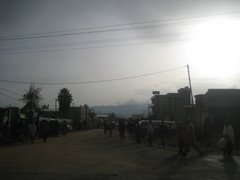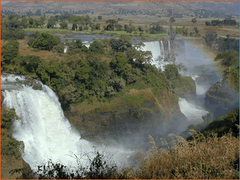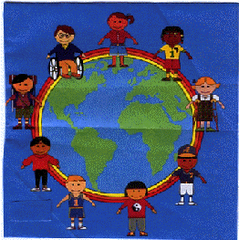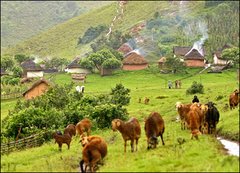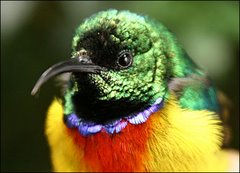What exactly is Ethiopia investing in?
Ethiopia's Chamber of Commerce says: (Source: http://addischamber.com/aboutethio/profdetail.asp?CID=26)
The EPRDF government has focused on reorienting the economy through market reforms, including structural adjustment program. As a result the state's direct role in economic activity has declined.
Major steps taken were:-
1.Tariffs have been cut
2.quota constraints relaxed
3.Licensing procedures simplified
4.Foreign exchange controls eased
5.Compulsory cooperative membership and grain delivery discontinued and privatization begun.
The government has also adopted Agriculture -Led Industrialization policy as a central plank of its development programme with a focus on small farms and labor intense industrialization increased agricultural activity will be achieved primarily through an extensive extension program.
The Full poverty Reduction Strategy paper (Full PRSP) prepared by the government in full participation with all Stakeholders provides a good opportunity to focus on alleviating poverty and fostering medium - to long-term development.
Investment is rising since reforms began in 1992. Saving, as in most developing countries is very low. Both savings and investment are improving in the aftermath of the Ethio-Eritrea war. Foreign direct investment is increasing Saudi Arabia being the major source (60%) of the FDI.
So, according to Ethiopia's government, Ethiopia is investing in the people, free market, farmers, small farms, industry, job opportunities, and infrastructure for long-term development.
But, according to Ethiopia's budget spending, Ethiopia is investing in military, small arms, and kissing America and the UKs butt so that they can give them more weapons and money for more weapons.
Ethiopia spends 295,900,000 USDollars (on record) on developing its military. Compared to all the countries of the world, Ethiopia is above average in terms of military spending. It has the fifth largest military force in sub-Sahara Africa. 296 millions US dollars.
Now in terms of railway and road (infrastructure) spending, it is surprisingly below average. Ethiopia has merely 681 km of railway - which it shares ownership with Djibouti.
Ethiopia has 33,856 km of roads of which only 4,367 km is paved roads. 29,489 km is unpaved roads! Afghanistan has more roads than Ethiopia. Namibia, Ghana, Guinea, Madagascar, Angola, Uganda, Tanzania, Ivory Coast, Cameroon, Zambia, Zimbabwe, and Congo have more roads than Ethiopia.
Let's examine the technological infrastructure: Ethiopia has 88 Internet hosts. Out of 233 countries, Ethiopia ranks 192. Cape Verde - a 4 thousand sq km island off the coast of Senegal- has 234 Internet hosts. Eritrea, Burkina Faso, Uganda, Djibouti, Rwanda have thousands more Internet hosts than Ethiopia. Christmas Island has 2368 Internet hosts for their 135 sq km island (smaller than Washington, DC) - Santa and his elfs are more connected to the world than Ethiopians.
Ethiopia has the capacity to do much. It has the land, natural resources, and human resources to accomplish lots. It has a greater responsibility than most countries to build its infrastructure and economy, because it has a greater population - that is growing at an above average rate (about 4%). In a decade Ethiopia will have one of the greatest populations in the world.
But instead Ethiopia is doing little for itself. In result, outside countries and resources are coming in trying to correct our problems in a careless manner - and they are not careless because they don't care but they are careless because it is not their own nation, so their capacity to care is much smaller than an Ethiopian national. Example: China built a highway - a highway sounds good, it is a road; however, the highway is misplaced and seems to be more of a burden than a positive development. People walk across the highway; cabs stop in the middle of the highway to drop off passengers; cows/goats/donkey travel the highway.
I pose the question again: when will Ethiopia invest in Ethiopia?
